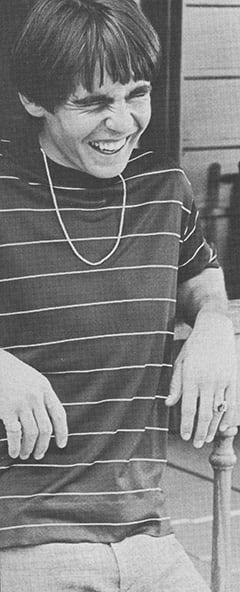
(Ed. note: This is a typical Davy interview—it happens all the time on the Monkee set.)
Most interviews are as rule-bound as a mid-semester exam. You meet the star, always in the presence of the public relations man. The interview takes place either between scenes on the set—probably in the star’s dressing room—or over a lunch that’s gone cold because there’s never enough time to eat.
Not so with Davy Jones. To arrive on the set ready for an interview is one thing; to have Davy Jones in front of you, spilling out his life story, is quite another.
Take a for instance:
Where is Davy? Permalink
I’m let onto Stage 7 of the Columbia lot by the set policeman who’s stationed there to keep out those without passes. He lets me by and I look around the stage. There is probably nothing so unimpressive as a sound stage. It’s like a gigantic drafty garage, with only one small area being used at one time. Ropes sprawl all over the floor. People sit around looking at each other, at scripts, or into space. The only action going on now is at the very far corner of the vast stage, where a tiny square, approximately 20 by 20 feet, is sectioned off and a scene is being shot.
Finding a vacant canvas-backed chair I sit, waiting for someone to discover me and direct me to Davy. Finally the publicity man picks his way carefully over the ropes, introduces himself, and says he’ll take me back to Davy’s dressing room when he’s free. I try to watch the action going on in front of the cameras, but all that’s visible of Davy is his shiny brown hair, parted in the middle and hanging almost to his eyes, and one pajamed leg (he’s wearing spotted pajamas for this particular segment).
The dressing room Permalink
Again the publicity man looms into view. This time he’s dispensed with the crew of Japanese radio execs who’ve been taping, Japanese radio spots with the Monkees all day (the four are headed to Japan in the near future). He’s now ready to lead me to Davy’s den. Through the back of the dark sound stage he goes, with me close on his heels—through the door and into a narrow alley (still inside the same sound stage). There stands Davy’s trailer. A couple of steps and we’re inside a sumptuous living room, shared by Davy and Micky. The front room is a decorator’s delight, in miniature. The rugs are ankle-deep and the lights are just barely at seeing level. Turn right and walk up two more steps and you’re in Davy’s bedroom-dressing room. Go left and there’s Micky’s. The top of a double bunk bed is occupied at the moment by Mike Nesmith’s stand-in who’s dead asleep and snoring lightly. All the kids who work around the Monkees learn in short order to sleep whenever and wherever they can, no matter how much noise is going on around them.
Davy sits there calmly, thumbing through a script. My first thought is, he’s all brown, from his deep golden tan to his deep brown eyes and thick brown-black eyebrows, to his sleek brown hair. He looks at me quizzically as if to say, I’ve been here 3 ½ minutes and you’re late. I apologize for keeping him waiting, thinking of the hour I’d just spent twiddling my thumbs and watching the top of Davy’s head.
Phones and bells Permalink
Suddenly he breaks into a delightful smile, says forget it, and turning to face me settles down for the interview—and the phone rings. “Hello,” answers Davy. It’s his lawyer, and whatever’s said makes Davy radiantly happy. Politeness kept me from asking what the problem was, but it was obviously settled in Davy’s favor.
Watching him on the phone I thought how tired he looked. His skin was drawn tightly over his cheekbones, giving him a pale look. His face, usually so lively, held almost no expression when he stopped smiling.
The tape recorder was on, everything was set—and the bell shrills across the trailer. It’s time for Davy to get back to work.
Another chance Permalink
“Look, Davy,” if I were to interview him this is my last chance. “I’d like to see how you live anyway. Is there a chance to come up to your house and interview you there? Do you have any time over this weekend?”
“Sure you can,” he says, pulling himself out of the chair with what looked like a giant effort (it was late Friday, and he’d been working non-stop all week). “Besides, I’m very tired right now.” Walking out of his trailer he hastily gives me his address and telephone number. “See you Saturday morning at 10:00,” he says.
If this interview with Davy Jones had a happy ending, you can imagine the hundreds that don’t. But then that’s just life with the Monkees!

